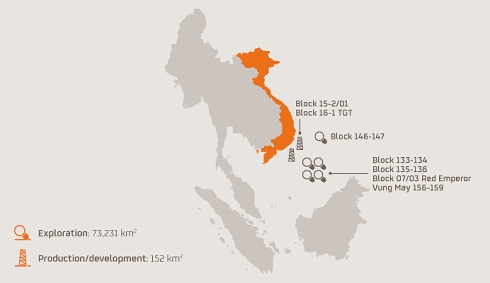[NGW Magazine] Vietnam Caves in to China
Vietnam has its back against the wall once again, and just like many times before, it comes amid growing pressure from its long-time rival, largest trading partner, and giant neighbour to the north: China.
According to a March 29 BBC report, which cited an industry source, state-owned Petro Vietnam ordered Spanish energy firm Repsol to suspend an oil and gas project, which was in its final stages, off the country’s southeast coast. The pull-out could cost Repsol some $200mn in lost investment, the report said. Repsol did not respond to NGW requests for comments on the matter.
The site in question is called Ca Rong Do (Red Emperor) and lies in block 07/03 in the South China Sea. Repsol's local subsidiary estimates that it contains 45mn barrels of oil and 172bn ft³ of gas. The area is also clearly within Vietnam’s UN-mandated 200-nautical mile exclusive economic zone (EEZ), but is also claimed by China as part of its U-shaped, nine-dash line which covers nearly 90% of the South China Sea. A drilling rig, the Ensco 8504, was scheduled to depart from Singapore for the drill site on March 22, the BBC report added. Repsol has already contracted Yinson, a Malaysian owned company, to provide a floating production storage and offloading (FPSO) vessel at the site for 10 years at an estimated cost of more than $1bn.
It is the second time in less than a year that Hanoi has bowed to Chinese pressure in its own waters. In July, Vietnam also ordered Repsol to stop oil drilling operations at an adjacent location, Block 136/3, in response to what media at the time called “threats from China.”
The geopolitical squabble last year came just days after Repsol reportedly made a major gas discovery in the area. In late November, US president Donald Trump offered to mediate territorial maritime disputes between the two parties. His offer was ignored.
Repsol has a global footprint with both upstream and downstream activities in 37 countries. In the Asia-Pacific region, the Madrid-based company has operations in China, Singapore, Indonesia, Malaysia and Vietnam where it holds mineral rights to seven exploration and production (E&P) blocks.
Possible geopolitical triangle
The Red Emperor cancellation comes as Vietnam goes long on gas, striking a number of deals in the past year that are projected to at least triple the country’s gas output within eight years.
One of these recent deals, however, could also up the geopolitical ante not only between Beijing and Hanoi but between Beijing and Washington as well. Vietnam and US major ExxonMobil recently agreed to develop the Ca Voi Xanh, or so-called Blue Whale offshore gas project, the country’s largest gas project.
Blue Whale is a game-changer for not only US-Vietnamese bilateral relations and energy company partnerships but economically as well. Vietnam has previously said that revenues from the field could be as much as $20bn for the national budget over the life of the project.
The Blue Whale project is in deep-water block 118, about 55 miles (88 km) off the Vietnamese coast, in an area only 10 miles outside China’s nine-dash line. It remains to be seen if an American oil company, especially an oil major with ExxonMobil’s clout, would also bow to Chinese pressure to stop any future drilling activities.
Carl Thayer, Emeritus Professor at The University of New South Wales and an expert in Vietnamese relations, sees stark differences between Repsol’s recent project cancellation and Exxon’s Blue Whale project. “Oil exploration by Repsol in the waters around Vanguard Bank to the south of the Spratly islands and oil exploration by ExxonMobil in the waters off central Vietnam are two separate issues, he told NGW.
Moreover, China claims that it reached an agreement with Vietnam to maintain the status quo in the Vanguard Bank area, according to Thayer. “When Vietnam resumed oil exploration in this area last year China put enormous pressure on Vietnam reportedly even threating armed force. Vietnam backed down,” he said.
However, since ExxonMobil’s project is near but does not cross China’s unilaterally defined nine-dash line it is a different situation.
“Vietnamese sources intimate that both sides have reached an informal understanding that they will not interfere in activities by the other party if it falls on their side of a hypothetical median line. Both sides are free to make public protest but the understanding is that both sides will exercise restraint and not interfere. This understanding should reduce the risk to Exxon Mobil in its present operations,” he said.
However, Vietnam’s most recent kowtow to Chinese pressure over its Red Emperor project comes just weeks after the USS Carl Vinson anchored off the coast of the southeast Asian country at the port city of Danang, the first visit by an American aircraft carrier since the end of the Vietnam War in 1975.

Repsol's activities in Vietnam (Credit: Repsol)
Most analysts concede that by allowing an American super carrier to dock near Danang, the government in Hanoi is playing all of its geopolitical cards, in essence balancing the US and China off each other as it jockeys for influence, and in some aspects survival, in the region.
Thayer added that since Exxon is US listed, American commercial interests are directly involved. “It is a relatively minor matter for China to put pressure on Repsol, a Spanish company; but it would be a major matter if China took action against a US company,” he said. “Both the North Korean nuclear proliferation issue and the tariff contretemps between Washington and Beijing militate against China taking direct action against ExxonMobil.
Beijing, however, could seek to disrupt growing US-Vietnamese ties. “Beijing is more likely to press Hanoi to stop Exxon’s Blue Whale project and thus drive a wedge between Hanoi and Washington. Beijing will play the long game in the South China Sea while the US is focused on North Korea and its trade imbalance with China,” Thayer said.
Tim Daiss


.png_f1920x300q80.jpg)
